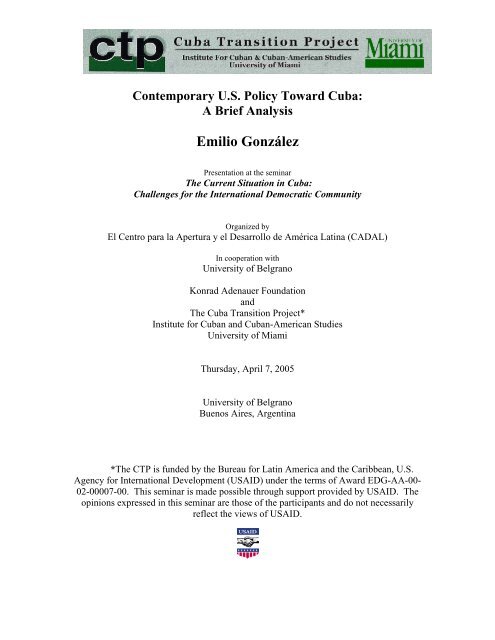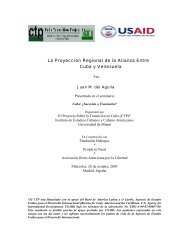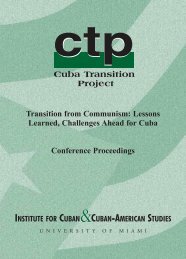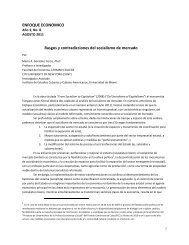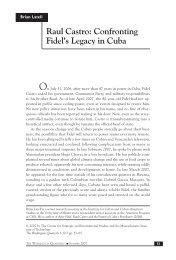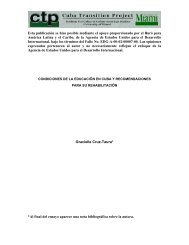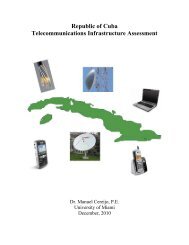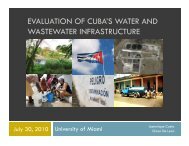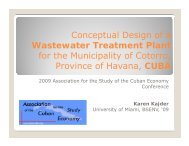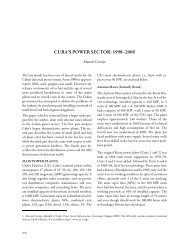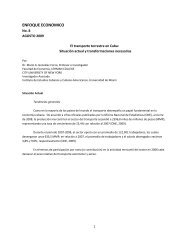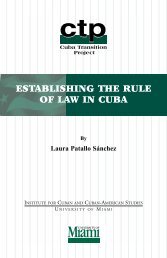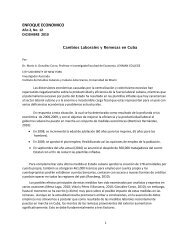Emilio González - Cuba Transition Project - University of Miami
Emilio González - Cuba Transition Project - University of Miami
Emilio González - Cuba Transition Project - University of Miami
You also want an ePaper? Increase the reach of your titles
YUMPU automatically turns print PDFs into web optimized ePapers that Google loves.
Contemporary U.S. Policy Toward <strong>Cuba</strong>:A Brief Analysis<strong>Emilio</strong> GonzálezPresentation at the seminarThe Current Situation in <strong>Cuba</strong>:Challenges for the International Democratic CommunityOrganized byEl Centro para la Apertura y el Desarrollo de América Latina (CADAL)In cooperation with<strong>University</strong> <strong>of</strong> BelgranoKonrad Adenauer FoundationandThe <strong>Cuba</strong> <strong>Transition</strong> <strong>Project</strong>*Institute for <strong>Cuba</strong>n and <strong>Cuba</strong>n-American Studies<strong>University</strong> <strong>of</strong> <strong>Miami</strong>Thursday, April 7, 2005<strong>University</strong> <strong>of</strong> BelgranoBuenos Aires, Argentina*The CTP is funded by the Bureau for Latin America and the Caribbean, U.S.Agency for International Development (USAID) under the terms <strong>of</strong> Award EDG-AA-00-02-00007-00. This seminar is made possible through support provided by USAID. Theopinions expressed in this seminar are those <strong>of</strong> the participants and do not necessarilyreflect the views <strong>of</strong> USAID.
I wish to thank the organizers <strong>of</strong> this conference, the <strong>University</strong> <strong>of</strong> <strong>Miami</strong>, theUniversidad de Belgrano and the Konrad Adenauer Foundation, for organizing such atimely and important gathering such as this. The subject <strong>of</strong> <strong>Cuba</strong> is one that inflamespassions on all sides <strong>of</strong> the political spectrum. Honorable people can disagree ondifferent aspects <strong>of</strong> <strong>Cuba</strong>’s role in the international political arena as well as <strong>Cuba</strong>’sdomestic political model, but only the most partisan <strong>of</strong> these can negate the totalitariannature <strong>of</strong> the Castro Government. In my view <strong>Cuba</strong> is not a Republic, it is not a Socialiststate, it is not a nationalist revolution and it is not an experiment in tropical Marxism. Incommercial terms, <strong>Cuba</strong> is a wholly-owned subsidiary <strong>of</strong> a small band <strong>of</strong> aging antidemocraticrevolutionaries that manage the affairs <strong>of</strong> state much like GeneralissimoTrujillo <strong>of</strong> the Dominican Republic or General Somoza <strong>of</strong> Nicaragua. There are no clearlines that distinguish when the Castro cabal stops and when government institutionsbegin.In a hemispheric context, Fidel Castro’s <strong>Cuba</strong> is a stain on the wave <strong>of</strong> democraticgovernments now flourishing, an insult to all <strong>of</strong> our collective consciences. It is withinthis context that the United States has established a decades-long policy <strong>of</strong> supportdemocracy while isolating <strong>Cuba</strong>’s anti-democratic leaders thus denying them theresources with which to foment political instability around the world.For over four decades, the policy <strong>of</strong> the government <strong>of</strong> the United States <strong>of</strong>America (U.S.) towards <strong>Cuba</strong> has been dominated by a bipartisan consistency both in theexecutive and legislative braches <strong>of</strong> the U.S. government. Since the enactment <strong>of</strong> the U.S.trade embargo and other sanctions toward <strong>Cuba</strong> in the early 1960’s to the results <strong>of</strong>Commission for Assistance to a Free <strong>Cuba</strong> implemented by the George W. Bushadministration in 2004, all policies towards the country’s communist regime have beensupported by both Democratic and Republican administrations.One <strong>of</strong> the most important aspects <strong>of</strong> the policy <strong>of</strong> the U.S. government vis-à-vis<strong>Cuba</strong> is to promote a peaceful transition to a democratic regime that respects individualrights and the democratic process. The <strong>Cuba</strong>n Democracy Act <strong>of</strong> 1992 (CDA), forexample, states that it should be the policy <strong>of</strong> the United States to seek a peacefultransition to democracy and a resumption <strong>of</strong> economic growth in <strong>Cuba</strong> through the1
careful application <strong>of</strong> sanctions directed at the Castro government and support for the<strong>Cuba</strong>n people and to continue vigorously to oppose the human rights violations <strong>of</strong> theCastro regime. 1 In order to reach these ends, the CDA seeks the cooperation <strong>of</strong>democratic countries in this policy. 2 The CDA can be viewed as a reinforcement <strong>of</strong> thetrade embargo imposed by the Kennedy administration in 1961. However, it goes furtherby stating that in order for <strong>Cuba</strong> to enter a transition to democracy, the President shouldencourage the governments <strong>of</strong> countries that conduct trade with <strong>Cuba</strong> to restrict theirtrade and credit relations with <strong>Cuba</strong> in a matter consistent with the purposes <strong>of</strong> this title. 3This is a clear message to other democratic countries (e.g., Spain, Canada, and yes,Argentina for example) that by curtailing economic relations with <strong>Cuba</strong>, they can actuallycontribute to the goal <strong>of</strong> a democratic transition and an end to decades <strong>of</strong> systemic humanrights abuses.The CDA was introduced by Robert Torricelli, a former member <strong>of</strong> the U.S.Senate from New Jersey and an influential member <strong>of</strong> the Democratic Party. The bill waspassed by 102 nd Congress, which was led by the Democratic Party yet signed byRepublican President George H.W. Bush. The CDA was the first step in emboldening theU.S. trade embargo against <strong>Cuba</strong>, which is viewed as a key vehicle to help bring aboutpr<strong>of</strong>ound change within <strong>Cuba</strong>.Continuing to further promote the U.S. commitment to a free and democratic<strong>Cuba</strong>, the latter part <strong>of</strong> the 1990’s saw the passage <strong>of</strong> the <strong>Cuba</strong>n Liberty and DemocraticSolidarity (Libertad) Act <strong>of</strong> 1996. The act is commonly known as the Helms-Burton Act(HBA). The HBA is a reaffirmation <strong>of</strong> the CDA enacted into law in 1992. As a matter <strong>of</strong>policy, the HBA categorizes the Castro regime’s violations <strong>of</strong> human rights as massive,systemic and a threat to international peace. 4 Additionally, the HBA authorizes thePresident to furnish assistance and provide other support for individuals and independentnongovernmental organizations to support democracy-building efforts for <strong>Cuba</strong>. 5 This1 <strong>Cuba</strong>n Democracy Act <strong>of</strong> 1992, Section 1703, Statement <strong>of</strong> Policy, points 1 & 5.2 <strong>Cuba</strong>n Democracy Act <strong>of</strong> 1992, Section 1703, Statement <strong>of</strong> Policy, point 2.3 <strong>Cuba</strong>n Democracy Act <strong>of</strong> 1992, Section 1704, International Cooperation, point a.4 <strong>Cuba</strong>n Liberty and Democratic Solidarity (Libertad) Act <strong>of</strong> 1996, Title 1, Section 101, point 1.5 <strong>Cuba</strong>n Liberty and Democratic Solidarity (Libertad) Act <strong>of</strong> 1996, Title 1, Section 109, point a.2
support is qualified by supporting democratic and human rights groups and supportingthe visits and permanent deployment <strong>of</strong> Human rights monitors in <strong>Cuba</strong>. 6The continuity and steadfastness <strong>of</strong> U.S. policy is evident regardless whichpolitical party dominates the scene in Washington, D.C. The HBA was co-authored byJesse Helms, then a leading Republican Senator from North Carolina and Dan Burton, aRepublican Representative from the State <strong>of</strong> Indiana. The bill was signed by DemocraticPresident Bill Clinton and served to further congressionally codify U.S. sanctions against<strong>Cuba</strong>.The policy <strong>of</strong> the current Bush administration does not stray from the historicpositions taken by previous administrations. President George W. Bush, like hispredecessors, advocates further pressuring and isolating the Castro regime as a means toattain freedom for the <strong>Cuba</strong>n populace. The objectives <strong>of</strong> U.S. policy towards <strong>Cuba</strong> underPresident George W. Bush are clear; bring an end to the Castro dictatorship, assist the<strong>Cuba</strong>n people in a transition to representative democracy, and assist in the establishment<strong>of</strong> a market economy.In May 2002, President Bush stated that he “My Administration will oppose anyattempt to weaken sanctions against <strong>Cuba</strong>’s government” and “I will fight such attemptsuntil this regime frees its political prisoners, holds democratic, free elections, and allowsfor free speech”.President Bush has pursued an integrated policy to achieve these objectives bymaintaining and strengthening the trade embargo, breaking through the informationblockade, and ensuring that monies sent to <strong>Cuba</strong> for humanitarian purposes are notredirected to the government.To further advance these policy objectives, the President announced the creation,on October 10, 2003, <strong>of</strong> the Commission for Assistance to a Free <strong>Cuba</strong>. TheCommission, headed by Secretary <strong>of</strong> State Colin Powell and Secretary <strong>of</strong> Housing andUrban Development Mel Martinez, reported back to the President on May 6, 2004. TheCommission recommended an integrated approach to <strong>Cuba</strong> policy that provides for amore robust effort to support pro-democracy opposition groups within <strong>Cuba</strong> coupled with6 <strong>Cuba</strong>n Liberty and Democratic Solidarity (Libertad) Act <strong>of</strong> 1996, Title 1, Section 109, points 3 & 4.3
measures that limit the Castro’s regime’s manipulation <strong>of</strong> humanitarian policies tobuttress its survival strategies.To underscore the fact that U.S.-<strong>Cuba</strong> policy is not unique, but is instead part <strong>of</strong> abroader policy to promote freedom and democracy throughout the world, the Presidentmade global freedom and democracy a key component <strong>of</strong> his inaugural speech this pastJanuary. The President succinctly espoused that it will the policy <strong>of</strong> the United States toseek and support the growth <strong>of</strong> democratic movements and institutions in every nationand culture, with the ultimate goal <strong>of</strong> ending tyranny in the world. 7 He also adds thatdemocratic reformers facing repression, prison, or exile can know: America sees you forwho you are: The future leaders <strong>of</strong> your free country. 8President Bush’s policy towards <strong>Cuba</strong>, through the findings <strong>of</strong> the Commissionreport, was designed to create meaningful discussion on the issue <strong>of</strong> a democratictransition in <strong>Cuba</strong>. Just as the United States has invested political capital in promotingand defending democracy and human rights throughout the world, so too must the nations<strong>of</strong> Latin America step up and be counted. What will the nations <strong>of</strong> this hemisphere do topromote the same liberties we all now enjoy? Will the hemisphere embrace an equallyrepressive successor regime in Havana or will it press for meaningful democraticreforms?As we speak today the United Nations Commission on Human Rights is meetingin Geneva. Over the years this once august world body has degenerated in a collection <strong>of</strong>the world’s most egregious human rights abusers. Rather than state and vote for theobvious, too many <strong>of</strong> the new democracies in our hemisphere are quibbling over howthey should vote, what their vote means and how their vote will be interpreted amongtheir domestic political constituencies. The stakes are too high.Latin America, particularly countries who have suffered all too recent antidemocraticand personalistic political regimes, need to stand up and be counted. Thereckoning is coming and the 11 million people <strong>of</strong> <strong>Cuba</strong> now being held hostage by thelongest reigning dictator in Latin American will one day rise up and ask, “Which sidewere you on”? I look forward to your questions. Thank you.7 President Bush’s Inaugural Address, January 20, 20058 Ibid.4
About the Author<strong>Emilio</strong> T. González, PhD, serves as Senior Managing Director <strong>of</strong> Tew Cardenas'Global and Government Affairs practice in <strong>Miami</strong> and Washington, D.C. focusing oninternational strategic planning and government affairs.Prior to joining Tew Cardenas, Dr. González was Director for Western HemisphereAffairs at the National Security Council, Washington, D.C. In this capacity he served as akey National Security and Foreign Policy advisor to President George W. Bush and Dr.Condoleezza Rice. Dr. González remains active in international politics. He <strong>of</strong>ten meetswith Heads <strong>of</strong> State, Foreign Ministers, Trade Ministers, ambassadors and politicalleaders from throughout the hemisphere. Additionally, Dr. González is a notedcommentator on Hispanic and international affairs and has appeared in local, national andinternational radio and television.An international affairs specialist, Dr. González has spent most <strong>of</strong> his pr<strong>of</strong>essional careerinvolved in foreign affairs and international security policy issues. He has served in ortraveled to almost every country in the Western Hemisphere on numerous occasions, andhas represented the United States Government on special diplomatic missions.Dr. González completed a distinguished military career that spanned nearly threedecades. During this time he served at the U.S. Embassies in El Salvador and Mexico,taught at the United States Military Academy at West Point and headed the Office <strong>of</strong>Special Assistants for the Commander-in-Chief <strong>of</strong> the U.S. Southern Command.González is considered one <strong>of</strong> the most accomplished Foreign Area Officers in theDepartment <strong>of</strong> Defense.A graduate <strong>of</strong> the <strong>University</strong> <strong>of</strong> South Florida in Tampa with a B.A. in InternationalStudies, Dr. González also earned MA degrees in Latin American Studies from Tulane<strong>University</strong> in New Orleans, Louisiana and in Strategic Studies and National SecurityAffairs from the US Naval War College in Newport, Rhode Island. He was awarded thePh.D. degree in International Relations from the Graduate School <strong>of</strong> InternationalStudies, <strong>University</strong> <strong>of</strong> <strong>Miami</strong>, where he also received the Graduate School Award forAcademic Achievement. He has been awarded numerous decorations from the UnitedStates and has also been decorated by the governments <strong>of</strong> El Salvador, Mexico,Colombia, Guatemala, the Dominican Republic, Honduras and Nicaragua. Dr. Gonzálezis a Knight <strong>of</strong> Malta.


